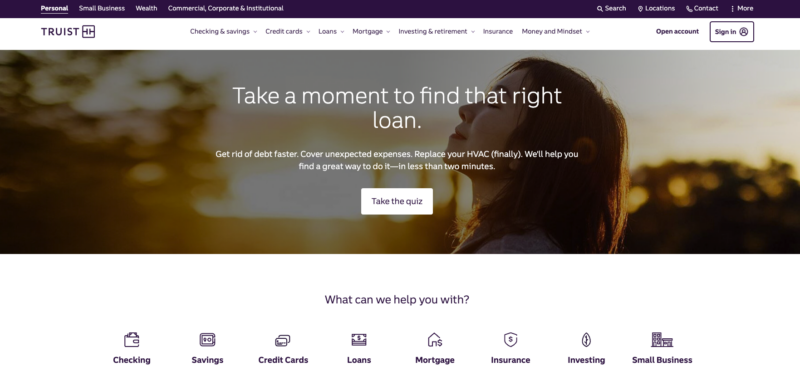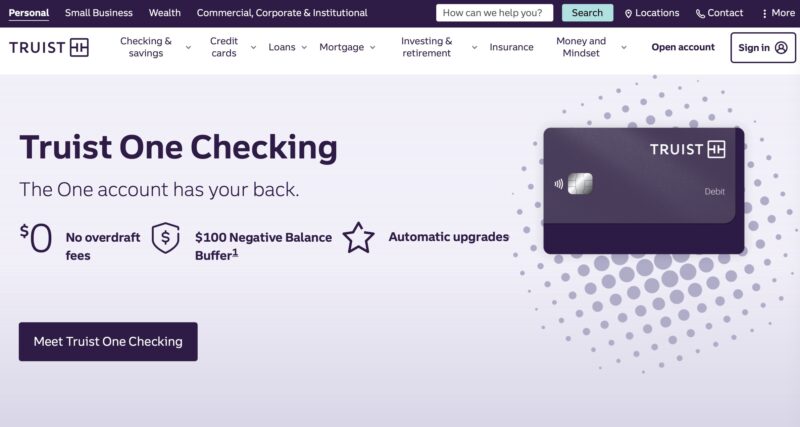Truist Bank is a regional bank with more than 2500 branches, serving clients in the Mid-Atlantic or Southeastern United States. You can access just about any account type or loan, and you may have a better experience than dealing with the much larger national banks.
However, Truist won’t be the best option for everybody. Depending on your banking habits, you may find their fees higher than the competition, and as a regional bank, there are geographic limitations.
In this Truist Bank review, we’ll cover the various accounts, fees, and pros and cons of dealing with Truist Bank.
Table of Contents
What Is Truist Bank?

Truist Bank operates approximately 2,700 physical locations in 15 states and Washington, D.C., with its corporate headquarters in Charlotte, NC. The institution offers personal banking, business banking, and wealth management services.
Truist is FDIC-insured (FDIC Cert# 9846) and was officially formed in December 2019 with the merger of BB&T and SunTrust.
The merger was finalized in 2022, and all brick-and-mortar branches now display the Truist Bank logo. In addition, the baseball stadium for the Atlanta Braves was renamed from SunTrust Park to Truist Park in January 2020.
Truist Bank Locations
You can find local branches and ATMs for Truist in these states:
- Alabama
- Arkansas
- Florida
- Georgia
- Indiana
- Kentucky
- Maryland
- Mississippi
- New Jersey
- North Carolina
- Ohio
- Pennsylvania
- South Carolina
- Tennessee
- Texas
- Virginia
- Washington, D.C.
- West Virginia
Most states have plenty of locations, although there are relatively few branches in Arkansas, Mississippi, Indiana, and Ohio.
Truist Bank Account Types
Truist offers two checking accounts, two savings accounts, CDs, and a money market account. Here’s a breakdown of each account.
Checking Accounts

Two checking accounts are available that you can apply for online and in-branch. In addition to a regular Visa Debit Card, you can get a Delta SkyMiles® Debit Card (up to $95 annual fee) that earns 1 mile per $2 in purchases.
Truist One Checking
Minimum Opening Deposit: $50
Monthly Fee: $12 (can be waived, see conditions below)
If you need a full-service checking account, Truist One Checking is your best bet. It offers the following benefits:
- No overdraft fees
- Free personal checks (10-pack)
- Up to $100 Negative Balance Buffer overdraft protection (select members only)
- Earn 10% to 50% more cashback or miles on select Truist credit cards
You can unlock additional benefits when your monthly average balance reaches certain levels, such as $10,000 and $25,000. These loyalty perks include complimentary banking accounts and reduced fees.
The standard monthly fee is $12, but there are five ways to waive it:
- Make $500 in qualifying monthly direct deposits
- Maintain a minimum $500 ledger balance in at least one Truist banking and investment account
- Have a personal Truist credit card, mortgage, or consumer loan (excludes LightStream products)
- Link a small business checking account
- Are a student age 25 or younger
Related: Truist Bank Promotions
Truist Confidence Account
Minimum Opening Deposit: $25
Monthly Service Fee: $0 to $5
If you don’t need paper checks, the Confidence Account makes it easy to receive deposits, pay bills, and make ATM withdrawals. There are no overdraft fees, and you can pay bills through the Truist mobile app. You also have access to over 3,000 ATMs.
The $5 monthly fee can be waived if you make at least $500 in monthly deposits or complete ten qualifying transactions.
Learn More: Best Free Checking Accounts
Savings Accounts
Truist offers several interest-bearing products available, although you may encounter monthly service fees if you don’t have a Truist checking account or maintain a minimum monthly balance.
While Truist savings accounts allow you to keep your savings in the same place as your checking balance, an online-only high-yield savings account can be a better choice as you’re more likely to earn a higher interest rate and not pay any monthly fees.
Truist One Savings
Minimum Opening Deposit: $50
Monthly Service Fee: $0 to $5
A Truist One Savings account can be a convenient place to park small amounts of excess cash you don’t need to spend today but may need to quickly transfer to your checking.
Unfortunately, all balances up to $99,999,999,999 only earn 0.01% APY, and you may encounter a $5 monthly service fee. Larger savings balances should be kept elsewhere.
Related: SaveBetter Review: A New Way to Earn More Interest
Truist Confidence Account
Minimum Opening Deposit: $50
Monthly Service Fee: $0
If you have a Confidence Checking Account, this savings account can be a natural next step as you won’t pay a monthly fee. It offers overdraft protection, but the interest (0.01%) is negligible.
Truist One Money Market
Minimum Opening Deposit: $1,000
Monthly Service Fee: $0 to $12
A money market account can potentially earn better rates than a traditional savings account, although this account only earns 0.01% APY. You can also make up to six monthly withdrawals through debit cards and checks.
Related: Best Money Market Accounts Rates
Truist CDs
Minimum Opening Deposit: $1,000 (32 days to 60 months) or $2,500 (7 to 31 days)
Monthly Service Fee: $0 to $12
You may earn competitive rates on bank CDs if you’re willing to leave your money untouched for several months or years. Truist’s minimum $1,000 deposit is similar to other brick-and-mortar banks but higher than some online-only platforms.
Interest rates vary depending on which state you live in, but at a quick glance, I noticed rates as high as 5.00% APY over seven months and 4.50% APY over 12 months.
Related: Best 12-Month CD Rates
Truist Loans
Truist offers a wide range of borrowing options, from personal and auto loans to mortgages and Home Equity Lines of Credit, even boat and RV loans:
- Personal loans
- Home mortgage (purchase and refinancing)
- Home equity line of credit (HELOC)
- Auto loans
- Boat and RV loans
Other Banking Services
You can also access these services through Truist:
- Business Banking: Small business and commercial business checking accounts and tools
- Credit Cards: Enjoy travel rewards, cash back, low APR, and secured credit cards
- Investing: Self-directed and robo-advisor trading accounts are available. Free stock trades are available for qualifying accounts.
- Insurance: Compare rates for life insurance, disability insurance, long-term care, and property coverage options
- Truist Wealth: Wealth management services for clients with a high net worth.
Truist Bank Fees
A negative tradeoff of using a brick-and-mortar bank is the increased likelihood of paying account service fees and other incidental charges that online banks typically don’t charge.
- Monthly maintenance fee: $0 to $12 per account (it’s possible to waive this fee with qualifying deposit amounts, transactions, or average balance activity)
- Overdraft fee: $0
- Paper statements: $2
While Truist’s fees are competitive with most brick-and-mortar banks, you will save money by opening an account with an online bank. That said, many people still prefer having the option of walking into a physical branch to do their business.
Truist Bank Pros and Cons
If you live in a state that’s serviced by Truist Bank, it’s a solid choice for traditional banking. But it’s not without its drawbacks. Here is my list of pros and cons.
Pros
- Wide range of banking and borrowing products
- Over 2500 bank locations, thousands of ATMs
- Multiple ways to avoid monthly services fees
Cons
- Low-interest rates on savings and money market accounts (0.01% APY)
- Only available in 15 states and Washington, D.C.
- High-standard monthly fees
- No 100% fee-free checking account
Alternatives to Truist Bank
Before you sign up with Truist bank, you may want to consider the following banks, which offer nationwide bank access, and may have superior account options.
Bank of America
Bank of America has full-service banking across most states in the Union to open checking accounts, savings accounts, and loans. This service offers investment accounts through Merrill Edge and customers with a high account balance can enjoy Preferred Rewards loyalty perks.
Learn More: BestBank of America Promotions
Chase Bank
Chase Bank offers several personal and business checking and savings accounts along with a few ways to waive on monthly fees. They also have at least one retail branch in each mainland state.
Learn More: Best Chase Bank Promotions
Ally Bank
If you’re willing to do all of your banking online, you can get a no-fee checking account from Ally Bank, along with a no-fee savings account that pays a high APY on all balances (4.00% APY at the time of writing). To get similar rates through Truist Bank, you’d have to lock your money into a Term CD.
Learn More: Ally Bank Review
Truist Bank FAQs
Yes, Truist bank is safe. Like all major banks in the US, Truist is an FDIC-insured institution, which means that your eligible deposits are insured up to the maximum limit.
While it’s a regional bank, Truist is one of the 10 largest banks in the US, alongside names like Wells Fargo, Bank of America, TD Bank, CitiGroup, and Goldman Sachs.
Yes, you can initiate an international wire transfer from your Truist Bank account through their Mobile Banking Wire Transfer Services. You’ll need to provide the recipients information, and the maximum wire amount is $500,000 on a 3-business day rolling period.
Is Truist Bank Worth It?
Despite being a regional bank, Truist is one of America’s ten largest banks, with many customers and physical locations. Its checking account options and expansive network of retail branches are the best reasons to consider this service.
Overall, Truist is worth considering if you live near a local branch and can avoid the monthly fee on your checking account. The non-checking banking products are helpful and provide some value, but other banks are better if you want nationwide bank access, free checking, or a high-interest savings account.
If you don’t need local branch access, an online bank or even a credit union can be a better fit, as you’re less likely to pay account fees and you’ll earn higher interest.
The post Truist Bank Review: How Do They Compare? appeared first on Best Wallet Hacks.
from Best Wallet Hacks https://ift.tt/6RkG0N3
Comments
Post a Comment
We will appreciate it, if you leave a comment.